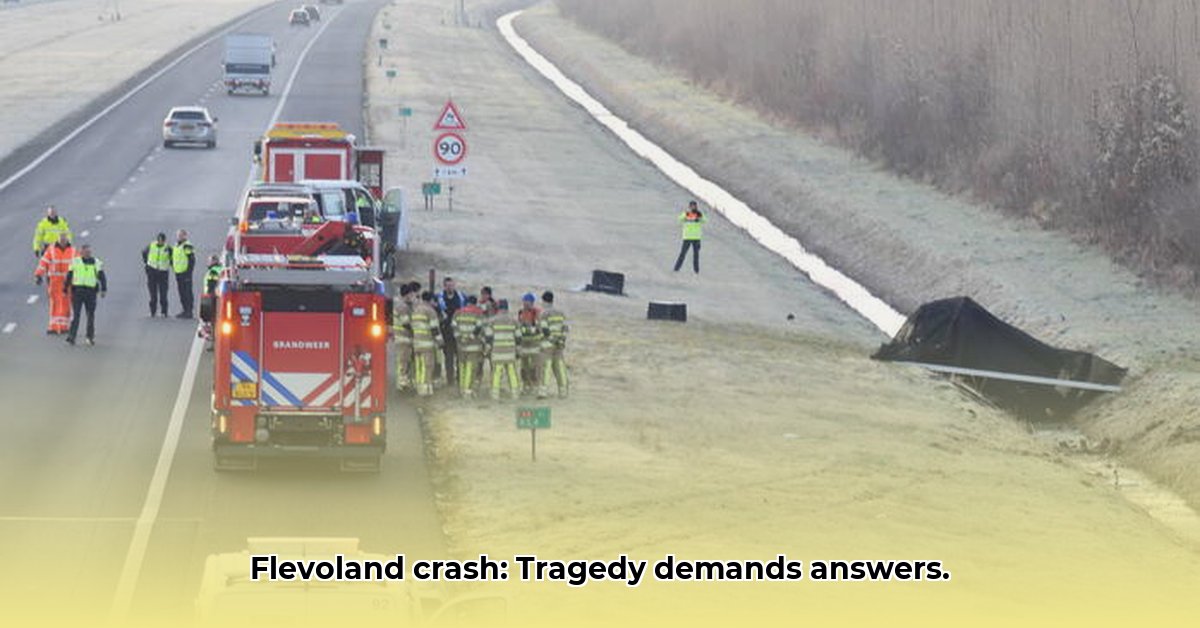
The recent tragic car accident in Flevoland, resulting in the deaths of young drivers, has shocked the nation. This isn't just a statistic; it's a devastating loss highlighting the urgent need for improved road safety, particularly concerning teenage drivers. This article examines the incident, explores potential contributing factors, and proposes actionable steps to prevent similar tragedies.
Understanding the Tragedy: What We Know and Don't Know
Preliminary reports indicate the accident involved teenage drivers, raising critical questions regarding experience, decision-making, and road conditions. While the investigation is ongoing, currently available information suggests a multi-faceted accident. The full picture will only emerge once the official accident report is released. Consequently, some aspects of this analysis remain speculative, awaiting concrete evidence.
How can we, as a society, better protect our young drivers? This accident underscores the critical need to critically examine each aspect of driver training, vehicle safety, and road infrastructure.
Potential Contributing Factors: A Complex Puzzle
Several factors may have contributed to this devastating accident. It's crucial to remember that these are potential causes and require further investigation to confirm.
Inexperience: Young drivers, statistically, are more prone to accidents due to limited experience and underdeveloped decision-making skills. Their brains, still developing, may lead to impulsive choices in high-pressure situations. Are our current licensing and driver education programs adequately preparing young people for the realities of the road?
Road Conditions: The condition of the road itself could have played a role. Were there sufficient safety measures, clear signage, and appropriate road markings? Poor visibility or challenging road design could have contributed to the accident. A comprehensive road safety audit of the affected area is crucial.
Vehicle Mechanics: Was the vehicle involved in the accident roadworthy? Were there any mechanical issues, however minor, that could have compromised safety? Regular vehicle maintenance and stricter vehicle inspections are essential.
Weather Conditions: Was the weather, on the day of the accident, a possible contributing factor? Adverse conditions such as heavy rain, fog, or strong winds can drastically reduce visibility and control, making driving significantly more hazardous.
Systemic Issues: Beyond individual factors, it's essential to consider broader systemic issues. Are our driver education programs providing sufficient training? Are laws effectively enforced, and are there suitable support systems in place for young drivers?
Actionable Recommendations: A Path Towards Safer Roads
This tragedy demands immediate action. A collaborative effort across various stakeholders is vital to creating safer roads for all. Here's a practical plan:
Comprehensive Investigation: A thorough investigation is paramount. This must be independent, transparent, and meticulously scrutinize all aspects of the accident, from the scene to the drivers’ actions, road conditions, and vehicle maintenance, leading to a publicly accessible report.
Enhanced Driver Education: Our driver education programs must be revamped to include more comprehensive training in risk assessment, hazard perception, and emergency response. Simulations and supervised practice driving are crucial.
Road Safety Audits: Regular independent audits of Flevoland's roads are essential to identify and rectify potential hazards promptly. This includes improvements to road design, signage, and safety infrastructure.
Stricter Enforcement: Effective enforcement of traffic laws is critical. This involves increased police presence, stricter penalties for violations, and a zero-tolerance approach towards reckless driving. We must deter dangerous behaviour and reward safe driving practices.
Public Awareness Campaigns: Targeted campaigns educating young drivers and their parents about road safety, responsible driving, and the devastating consequences of reckless behaviour are essential.
Conclusion: A Shared Responsibility
The Ongeval Flevoland is a profound loss. By transforming this tragedy into a catalyst for change, utilizing a collaborative approach that involves drivers, authorities, educators, and communities, we can build safer roads. This isn't solely about preventing accidents; it's about saving lives. It is imperative to collaborate and achieve a safer future for all road users. Let us make this collective effort prevent future heartbreaks.